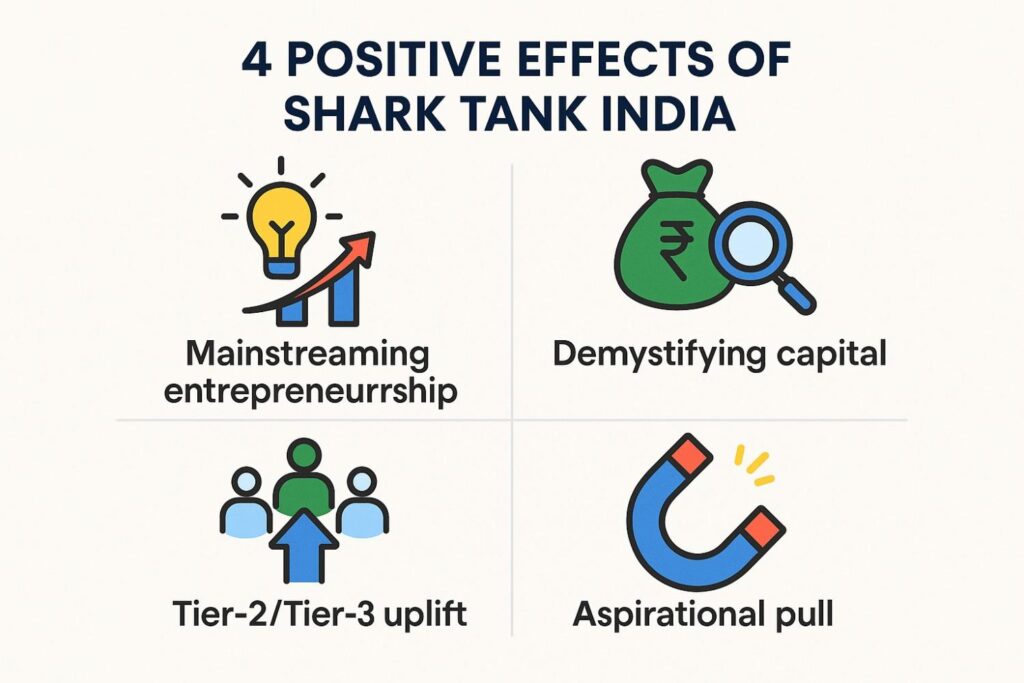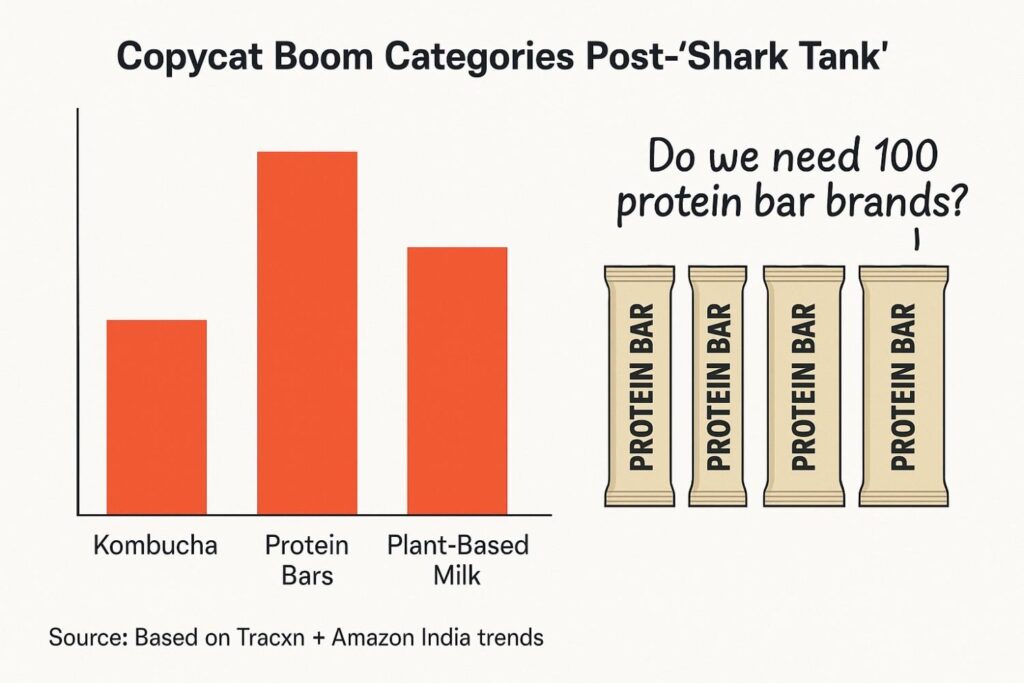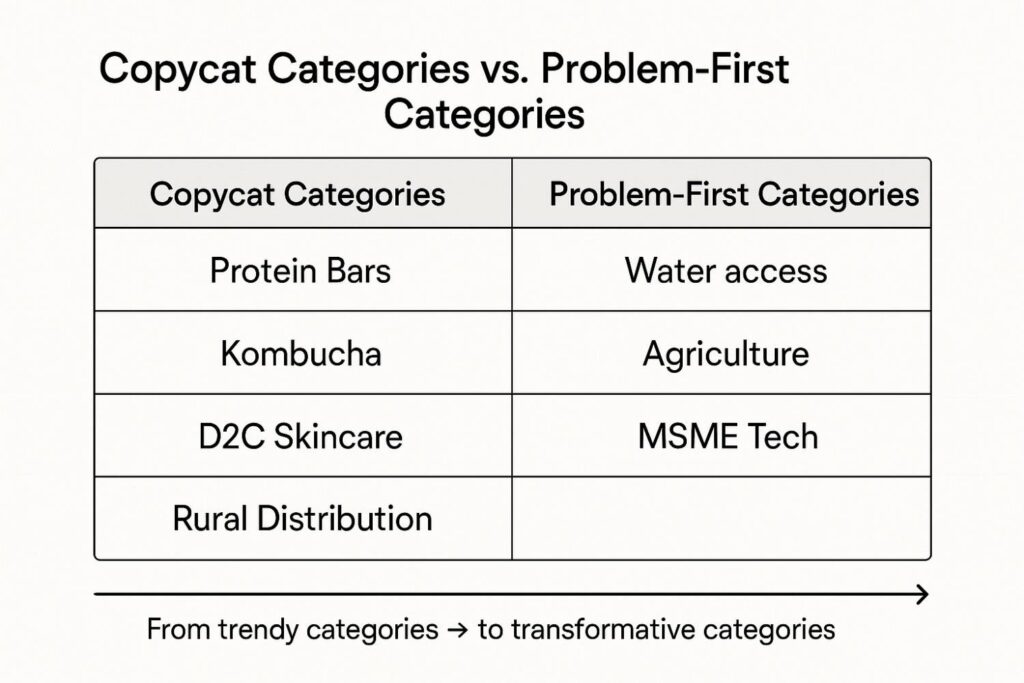Table Of Content
- The Friday Night Dream
- The Positive Impact of the Shark Tank India Effect
- 1. Mainstreaming Entrepreneurship
- 2. Demystifying Capital
- 3. Tier-2/Tier-3 Uplift
- 4. Aspirational Pull
- The Rise of the Copycat Entrepreneur
- Why It’s a Problem
- Data Glimpses
- Why Copycat Entrepreneurship Happens
- 1. Availability Bias
- 2. Shortcut Thinking
- 3. Media Rewards Drama
- 4. Lack of Mentorship
- Are Copycats All Bad?
- What India Actually Needs
- Problem-First Innovation
- Judges and Media Responsibility
- Founder Responsibility
- Lessons for Founders Watching Shark Tank
- Closing: The Real Shark Tank Effect
- What is the Shark Tank India effect on startups?
- Why are so many copycat entrepreneurs emerging after Shark Tank India?
- Are copycat startups bad for the ecosystem?
- How does Shark Tank India impact Tier-2 and Tier-3 cities?
- What kind of startups does India really need?
- How can founders avoid becoming copycat entrepreneurs?
The Friday Night Dream
Every Friday evening, millions of Indians tune into Shark Tank India.
It has become more than a reality show — it’s a cultural moment.
Suddenly, words like valuation, equity, burn rate, and cap table are household terms. College students practice elevator pitches. Tier-2 founders tell their parents they don’t need a government job, they want to “build something.”
But alongside this cultural revolution comes a harder question:
👉 Is Shark Tank India inspiring a new generation of problem-solvers?
Or is it quietly creating an army of copycat entrepreneurs chasing the same ideas over and over?
The Positive Impact of the Shark Tank India Effect

Let’s be clear: Shark Tank India has done more for entrepreneurship awareness than perhaps any government scheme or incubator initiative in recent memory.
1. Mainstreaming Entrepreneurship
Before Shark Tank, most middle-class families saw business as “risky.” Startups were something “other people” did. Now, kids in Lucknow, Surat, and Bhubaneswar proudly tell their families, “I’ll pitch on Shark Tank one day.”
2. Demystifying Capital
Founders used to whisper about “funding.” Today, everyone from shopkeepers to schoolteachers knows what 5% equity for ₹50 lakh means. The democratization of startup finance is real.
3. Tier-2/Tier-3 Uplift
Shark Tank has showcased founders from Nagpur, Indore, Ranchi — proving innovation is not just a Bangalore-Delhi-Mumbai club.
4. Aspirational Pull
For many, appearing on Shark Tank is not just about funding. It’s validation. The chance to be seen, to inspire, to say “I am an entrepreneur.”
This is powerful, and should not be dismissed.
The Rise of the Copycat Entrepreneur

But with visibility comes mimicry.
Spend time in India’s startup circles and you’ll notice a pattern:
- A kombucha brand pitches on Shark Tank → within months, Instagram fills with new kombucha startups.
- A protein bar company gets funded → suddenly, “healthy snacking” startups mushroom across metros.
- Plant-based milk brand shines → within weeks, LinkedIn is flooded with copycat founders “launching the future of dairy.”
Why It’s a Problem
- Market Crowding: Do we need 100 protein bar brands? Probably not.
- Shallow Differentiation: Copycats rarely innovate beyond packaging and flavors.
- Unsustainable Valuations: Investor FOMO leads to inflated funding in crowded categories, setting startups up for failure.
Data Glimpses
- According to Tracxn, India saw a 300% rise in D2C food and beverage startups between 2020–2023, many in “lookalike” categories.
- Amazon India search trends show a 2x spike in “kombucha” and “protein bars” after Shark Tank episodes aired featuring those categories.
This isn’t coincidence. It’s the Shark Tank effect in motion.
Why Copycat Entrepreneurship Happens

It’s easy to dismiss these founders as unoriginal. But the psychology is deeper.
1. Availability Bias
Psychologists call it availability bias: we imitate what’s most visible. Shark Tank gives national primetime exposure to certain categories. For impressionable entrepreneurs, this becomes proof of concept.
2. Shortcut Thinking
India’s entrepreneurial culture is still young. Many believe the fastest way to success is to “do what already works.” Copying seems safer than exploring risky, untested problems.
3. Media Rewards Drama
Shark Tank is TV. Stories that “look fundable” or “look sexy” get airtime. A water analytics startup from a small town may be more impactful, but a protein bar pitch makes for better primetime drama.
4. Lack of Mentorship
In Tier-2/3 cities, access to seasoned mentors is limited. Young founders don’t have guides pushing them toward originality. Instead, they lean on visible templates: “If it worked there, maybe it will work for me.”
Are Copycats All Bad?
Not entirely. Copycat entrepreneurs bring energy and accessibility into the ecosystem.
- Many gain their first experience by replicating a model. Some go on to pivot and build original ideas later.
- Copycats can educate the market: 10 kombucha brands mean more Indians learn about kombucha. Even if 8 fail, 2 may become sustainable.
- For ecosystems in their infancy, copycats often play the role of awareness builders.
So while they crowd the space, they also expand the pie.
What India Actually Needs

But here’s the risk:
If India only produces copycats, we’ll never create our own category-defining companies.
Problem-First Innovation
We need startups solving India’s real, messy problems:
- Clean water access.
- Agricultural inefficiency.
- MSME digitization.
- Affordable health tech.
- Rural distribution.
These problems won’t go viral on TV — but solving them will define the future.
Judges and Media Responsibility
Imagine if Shark Tank India deliberately highlighted more “boring but vital” problem-solvers, even if their pitches weren’t glamorous. This could shift cultural cues for what “entrepreneurship” looks like.
Founder Responsibility
Aspiring founders should ask themselves before starting up:
👉 “Am I building because it excites me — or because I saw it on Shark Tank?”
Lessons for Founders Watching Shark Tank
- Get Inspired, Not Imitative
Use the show for confidence, not templates. - Look Beyond Trendy Categories
If everyone is making protein bars, ask: “What is nobody solving?” - Solve First, Raise Later
Funding should follow problem-solving, not precede it. - Think Long-Term Trust
Discounts and mimicry can win you customers today, but not brand loyalty tomorrow.
Closing: The Real Shark Tank Effect
Shark Tank India has been a cultural revolution — it has normalized entrepreneurship, opened doors for Tier-2 founders, and inspired millions.
But inspiration without originality risks turning into imitation.
The true legacy of Shark Tank India will not be measured in how many kombucha or protein bar startups it spawned.
It will be measured in whether the next generation of founders dares to:
- Solve India’s hardest problems.
- Build original, category-defining companies.
- Tell stories investors and customers have never heard before.
👉 Copycats may crowd the room. But originals will own the future.
What is the Shark Tank India effect on startups?
The Shark Tank India effect refers to the surge of new entrepreneurs inspired by the show, making business and funding discussions mainstream in Indian households. It has democratized entrepreneurship but also triggered a wave of copycat startups.
Why are so many copycat entrepreneurs emerging after Shark Tank India?
Many founders imitate visible categories (like protein bars, kombucha, or D2C skincare) due to availability bias, media influence, and the belief that copying proven ideas is safer than solving hard, original problems.
Are copycat startups bad for the ecosystem?
Not entirely. Copycats can expand consumer awareness and bring energy to the ecosystem. However, too many lookalike businesses crowd markets, lower differentiation, and risk unsustainable valuations.
How does Shark Tank India impact Tier-2 and Tier-3 cities?
The show has encouraged founders from smaller cities to pursue entrepreneurship, showcasing their ideas nationally. It has opened doors for first-generation entrepreneurs outside traditional startup hubs.
What kind of startups does India really need?
India needs problem-first innovators tackling water access, agriculture, healthcare, MSME digitization, and rural challenges — not just trendy consumer products inspired by TV.
How can founders avoid becoming copycat entrepreneurs?
By focusing on real problems they care about, validating ideas with customer research, and treating Shark Tank as inspiration for confidence — not as a template for business models.




